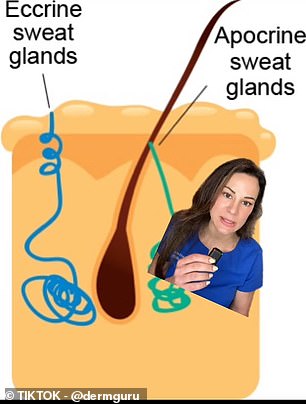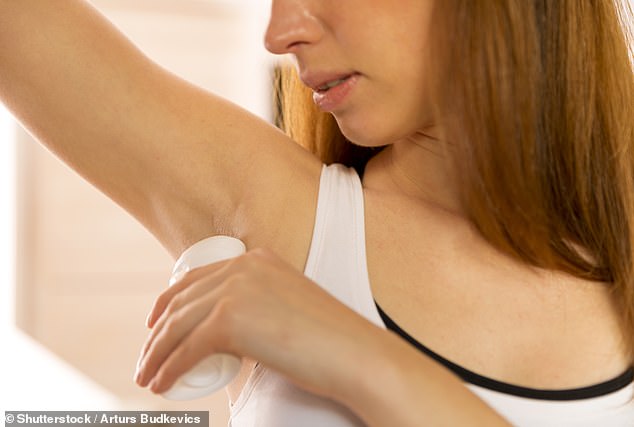“You’re doing it wrong!” Dermatologist shares tip for when to apply your deodorant
It’s part of our morning routine.
Wake up, get dressed and use deodorant before going out.
While most of us feel embarrassed leaving the house without putting on deodorant, experts have revealed that the morning isn’t the best time to apply it if you want it to be most effective.
Dr. Lindsey Zubritsky, a dermatologist from Mississippi, took to TikTok to share when you should actually use an antiperspirant.
“If you’re not putting on your deodorant at night, you’re doing it wrong,” she said in the video, which has been viewed more than 340,000 times.
She added: ‘At night our sweat glands are less active. This makes it absorb the antiperspirant more effectively.’

Dr. Lindsey Zubritsky, a dermatologist in Mississippi, took to TikTok to share when you should actually use an antiperspirant

Deodorants are intended to eliminate odors, but not to reduce perspiration (sweating). Meanwhile, antiperspirants contain aluminum-based ingredients that block sweat pores to prevent perspiration
Antiperspirant is absorbed more effectively at night as body temperature naturally drops to prepare our body for sleep due to the increased production of melatonin.
Melatonin is a hormone that determines how sleeping or awake people feel.
It is produced in the pineal gland of the brain and its release into the body is controlled by light.
During the day, when the eye absorbs light, melatonin levels in the body are low and as a result we feel awake.
But when darkness decreases and the amount of light absorbed by the eye decreases, more melatonin circulates through the body.
In addition to cooling body temperature, melatonin lowers blood pressure and slows the heart rate to let the body know it’s time for bed.
When you put on deodorant or antiperspirant at night, as melatonin increases, it works to block sweat and odor produced by sweat glands.
The body has two types of sweat glands: eccrine and apocrine glands.
Eccrine glands are present throughout the body and open directly to the skin surface and produce droplets of sweat.
However, apocrine glands develop in areas with hair follicles leading to the skin’s surface.
They are usually found in the armpits, scalp and genitals and produce body odor.
Applying an antiperspirant at night and giving it time to be absorbed helps clog the substance in the apocrine glands in the armpit, blocking sweat and odor more effectively than if you apply it right before you leave the door. goes out, puts in.
The American Academy of Dermatology notes that applying deodorant or antiperspirant at night gives the full six to eight hours needed to close the sweat ducts.
The benefits can be seen in both deodorants and antiperspirants, which reduce body odor in different ways.
Deodorants are intended to eliminate odors, but not to reduce perspiration (sweating).
Meanwhile, antiperspirants contain aluminum-based ingredients that block sweat pores to prevent perspiration.
However, do not apply your deodorant or antiperspirant immediately after your evening shower.
Both products are most effective when applied to dry skin, so be sure to dry them before applying.
In her video, Dr. shared Zubritsky also offers several other skin tips, including tossing on your Chapstick brand lip balm.
She said the products are likely to make your chapped lips worse because they are “filled with fragrances” that can lead to allergic contact dermatitis, a type of itchy rash.
Instead, she recommended products with petroleum jelly, which has been shown to help moisturize your face and hands. This is found in products such as Vaseline and Aquaphor.
Finally, Dr. Zubritsky for a type of acne called Pityrosporum Folliculitis, which is caused by a fungal infection and leads to bumps on the skin, the use of foot creams with antifungal properties.
